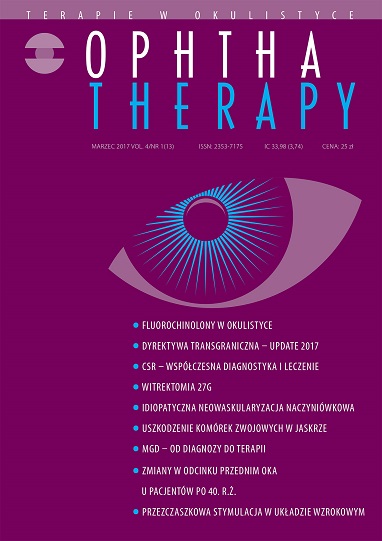The efficacy of ranibizumab in idiopathic choroidal neovascularization – a case series report
Main Article Content
Abstract
Objective: To evaluate the efficacy of the ranibizumab intravitreal injection in idiopathic choroidal neovascularization.
Material and methods: The study included 3 patients (4 eyes), aged 17, 37 and 46, with visual acuity deterioration, warping and distortion of the central image lasting for 2–5 weeks. Inflammatory background of the disease was excluded. The baseline examination and follow-up included the best corrected visual acuity (BCVA), fluorescein angiography and central retinal thickness (CRT) analysis using optical coherence tomography (OCT). When ICNV was diagnosed, intravitreal injections of ranibizumab were administered.
Results: During the first follow-up test, 3 eyes showed improvement of BCVA, and in the fourth eye BCVA remained unchanged. In funduscopy, all patients showed reduced haemorrhage and oedema of the central retina. The OCT showed a reduction of the CRT and improvement in the morphology of the macula. The observation period ranged from 4 to 55 months, and the number of repeated injections during the observation ranged from 2 to 5. Conclusions: Injections of ranibizumab into the vitreous brought a significant improvement in the function of the treated eye, and in the morphology of the retina in OCT.
Downloads
Article Details

This work is licensed under a Creative Commons Attribution-NonCommercial-NoDerivatives 4.0 International License.
Copyright: © Medical Education sp. z o.o. License allowing third parties to copy and redistribute the material in any medium or format and to remix, transform, and build upon the material, provided the original work is properly cited and states its license.
Address reprint requests to: Medical Education, Marcin Kuźma (marcin.kuzma@mededu.pl)
References
2. Cohen SY, Laroche A, Leguen Y et al. Etiology of choroidal neovascularization in young patients. Ophthalmology. 1996; 103(8): 1241-4.
3. Green WR, Wilson DJ. Choroidal neovascularization. Ophthalmology. 1986; 93(9): 1169-76.
4. Ho AC, Yannuzzi LA, Pisicano K et al. The natural history of idiopathic subfoveal choroidal neovascularization. Ophthalmology. 1995; 102(5): 782-9.
5. Poliner LS, Olk RJ, Burgess D et al. Natural history of retinal pigment epithelial detachments in age related macular degeneration. Ophthalmology. 1986; 93(5): 543-51.
6. Yoo MH, Boo HD, Kim HK. Result of photodynamic therapy for idiopathic subfoveal choroidal neovascularization. Korean J Ophthalmology. 2005; 19(4): 264-8.
7. Kang HM, Koh HJ. Intravitreal anti-vascular endothelial growth factor therapy versus photodynamic therapy for idiopathic choroidal neovascularization. Am J Ophthalmol. 2013; 155(4): 713-9.
8. Kim H, Lee K, Lee CS et al. Subfoveal choroidal thickness in idiopathic choroidal neovascularization and treatment outcomes after intravitreal bevacizumab therapy. Retina. 2015; 35(3): 481-6.
9. Wang F, Wang W, Yu S et al. Functional recovery after intravitreal bevacizumab treatments for idiopathic choroidal neovascularization in young adults. Retina. 2012; 32(4): 679-86.
10. Fukuchi T, Takahashi K, Ida H et al. Staging of idiopathic choroidal neovascularization by optical coherence tomography. Graefes Arch Clin Exp Ophthalmol. 2001; 239(6): 424-9.
11. Shah ASN, Kang QY, Fan XJ et al. Optical coherence tomography characteristics of responses to intravitreal bevacizumab in idiopathic choroidal neovascularisation. Int J Ophthalmol. 2016; 2(9): 271-4.
12. Zhang H, Liu ZL, Sun P et al. Intravitreal bevacizumab for treatment of subfoveal idiopathic choroidal neovascularization: results of a 1-year prospective trial. Am J Ophthalmol. 2012; 153(2): 300-6.
13. Bloom SM, Singal IP. The outer Bruch membrane layer: a previously undescribed spectral-domain optical coherence tomography finding. Retina. 2011; 31(2): 316-23.
14. Gomi F, Sawa M, Sakaguchi H et al. Efficacy of intravitreal bevacizumab for polypoidal choroidal vasculopathy. Br J Ophthalmol. 2008; 92(1): 70-3.
15. Byun YJ, Lee SJ, Koh HJ. Predictors of response after intravitreal bevacizumab injection for neovascular age related macular degeneration. Jpn J Ophthalmol. 2010; 54(6): 571-7.

